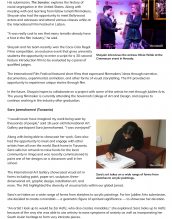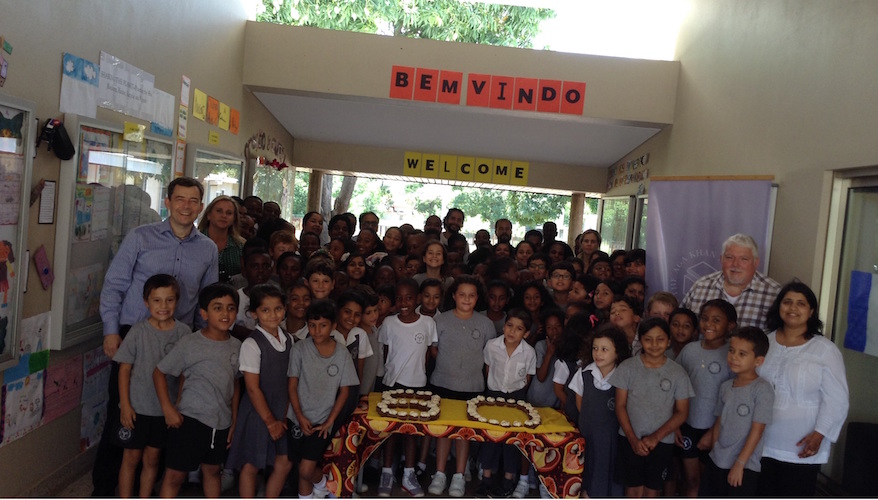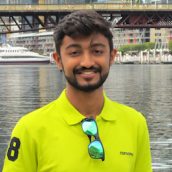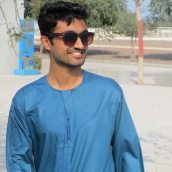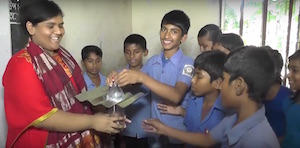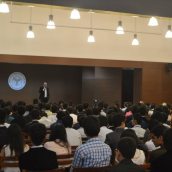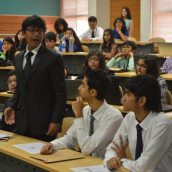Joseph Munyambanza: The story of a conqueror
As we sat for our lesson on a sweltering Tuesday afternoon, there was anticipation for the upcoming week-long break, obstructed only by the last lesson of the day. We sat for a while in a lazy stupor before our speaker arrived humbly apologising for his delay. Joseph Munyambaza was calm and composed as he began his initial talk on disparities of living. Despite appearing to be an average man who started by talking of ordinary sundries, he informed us that he was raised as a refugee and that it was education that propelled him to the position he is in today.
He began by narrating to us that life was free and full of enjoyment in the Congo. “There was plenty of food, I was always playing…” he recalls as he spoke of his six-year old self. Due to his age, he is now aware that he was shielded from most of the atrocities that must have taken place. His older siblings on the other hand, were not as fortunate. “My brother, who was a teenager at the time, was greatly disturbed by the events that took place…” Eventually, his older brother sought comfort in alcohol in an effort to forget what he had seen. Joseph’s family relocated to refugee camp in Western Uganda in a place called Hoima. Life was different and evidently, it was hard. The life of abundance and freedom was long gone and now the life of lack and want was all that there was. You can imagine the terrible living conditions in the refugee camp which was congested and dangerous. As he grew life seemed to eventually settle when tragedy struck. Joseph’s older sister passed away only a few days before exiting the refugee camp to attend university. What really moved me was the fact that she died under preventable circumstances. His sister died because his family did not have sufficient funds to pay for treatment.
This turning point propelled him to getting a placement in a high school outside the refugee camp where he was to begin to establish his academic prowess. He further explained that he knew how important his opportunity was so he would remain focused in his studies at all costs. Things were running smoothly throughout his years in high school with his school fees sorted out by the UNHCR. He was determined to also give opportunities to other refugee children who, just like him, were so full of potential. “When I was in my second year of secondary school, my friends and I wanted to enable other refugee children to access education. And so we started COBURWAS, a youth organization that represents Congo, Burundi, Uganda, Rwanda and Sudan. Refugees in the refugee camp we lived in came from these countries and we wanted to have a shared solution. All youth came together to think of solutions. Though we had many challenges we realised that lack of access to education was more dangerous. We started tutoring, which I did to enable children to get good grades and feel motivated to love school. We also worked for people to raise money to buy exercise books for the most vulnerable children in our midst. We were a club at first, but with time our programs expanded and we became a community-based organisation. The refugee community was of great help because they supported us with the little available and it meant so much in our small start.”
However, in his fourth and most senior year, his scholarship was withdrawn. “My education was initially supported by UNHCR in senior one but when I went to senior two they sent letters that UNHCR does not have more money to support education. Fortunately, a friend called Eric Glustrom who was starting an organisation helped me to complete senior four.” Even with a graduate certificate under his belt, he was unsure of what was to come next. Then, another whirlwind of events took place such that he was admitted to the ALA (African Leadership Academy) located in South Africa. This is an institution that is internationally recognised for producing innovators and entrepreneurs who are sure to make a positive impact within their home countries. Joseph says, “I had no dream of getting to a great school like ALA. I was already extremely grateful to be in my school that was the best in the district. And so even after being accepted to into ALA I still did not believe it until I landed in Johannesburg and was handed the key to my room. It was more than I could have ever dreamed of. And when I reached at ALA I wanted to be the best I could as a student, an ambassador to my fellow youth in the refugee camp and do well in class.”
All in all, his story was able to bring out the extent of the disparities of lives outside our own. The concept of war, forced migration and other forms of hardship is one that cannot be explained in a short period of time but were nevertheless highlighted in his talk. It is fascinating how a life can change simply as a result of joint efforts and self-motivation. By the end of his talk it was crystal clear that according to Joseph Munyambanza, education is a powerful tool.
By Bijou Mwaura, DP1
School spotlight Aga Khan Khan Academy Mombasa

Moiz Rajwani: Video Spotlight
Through the inquiry-based International Baccalaureate curriculum, the Aga Khan Academies aim to develop young individuals who will have the capacity to lead and to build strong civil democratic societies in the future.
Hear from one of our alumni, Moiz Rajwani, Class of 2018, and see how we have been turning this vision into reality at the Academies. Moiz was awarded a scholarship at Western University in Ontario, Canada and enrolled in September 2018.
Zia Chapman: Video Spotlight
Newsletter readers, click here to continue reading the newsletter.
Imtiyaz Hariyani (Class of 2014): From Hyderabad to Abu Dhabi and beyond
Imtiyaz Hariyani credits the Aga Khan Academy Hyderabad with giving him more than just the academic skills he needs to succeed at the undergraduate level. In his words, it has also provided him with “the ability to thrive in a pluralist society and function in an intellectually and culturally diverse setting.” This is particularly fitting for Imtiyaz as he has had experiences in various parts of the world: he has just finished in degree in Biology at NYU Abu Dhabi and has undertaken opportunities in Mombasa and Lisbon. He is working towards a career in research in Molecular Biology or Bioinformatics.
Imtiyaz is from Pune, India and first heard about the Aga Khan Academy Hyderabad in Feburary 2012 – he distinctly remembers making the decision to attend. His parents attended a seminar conducted by the Academy in Pune but they hesitated to ask Imtiyaz if he would be willing to study all the way in Hyderabad. For Imtiyaz, who had grown up at home and was attached to his family, their uncertainty was justified. And yet, he replied, “Why not?”
“Undeniably,” says Imtiyaz, “that day has shaped my career and is the reason for my academic progress and journey to NYU Abu Dhabi.”
At AKA Hyderabad, Imtiyaz was introduced to the merits of a global education and the International Baccalaureate programme. He quickly became familiar with an educational style quite different from what he had experienced in middle school: instead of rote learning, the Academy focuses on understanding concepts in a hands-on, practical manner. Imtiyaz believes that this approach to teaching, along with an emphasis on extra-curricular activities under the banner of Creativity, Activity and Service, led him to redefine what it means to be educated.The Academy in Hyderabad offered students outlets to shape the school’s future. “In the senior school’s first year of establishment, we also received the opportunity to initiate activities that would turn into legacies,” Imtiyaz recalls. With a classmate, he transformed his passion for cricket into the AKA Hyderabad Cricket League, now in its sixth season. “As an alumnus who returned to the Academy three years after graduating,” he reflects, “I was immensely proud to see how the students have respected and maintained the legacies set by the Class of 2014 and have contributed to uplifting their standards to an extraordinary level.”
After graduating from the Academy, Imtiyaz took a gap year and was offered a five-month internship at the Aga Khan Academy Mombasa. There, he tutored students in various subjects, supported the cricket team, and mentored a group of Middle Years Programme students.
Imtiyaz’s internship in Mombasa was the beginning of his global experiences in the past few years. “Mombasa was the first time I had left my country in twelve years and the fact that I was going to a new continent knowing nobody was intimidating at first,” he remarks. “Fast forward two and half years – it has become an essential part of my life.”Last summer, Imtiyaz pursued a research program in Lisbon, the city which is host to the Global Seat of the Ismaili Imamat. There, he celebrated the Diamond Jubilee of His Highness the Aga Khan, the Imam of the Ismaili Muslim community and founder of the Aga Khan Academies, which he thoughtfully describes as “the perfect occasion to rejoice and reflect upon life after the Academy, and to express our gratitude to the Imam who has served the worldwide community for sixty years and has contributed to uplifting the quality of countless lives globally.”
Currently, Imtiyaz is working as a Research Assistant at NYU Abu Dhabi. Imtiyaz attributes his desire to seek the best in his university education and to learn first-hand about other countries and cultures to his experience at the Academy in Hyderabad and the vision of His Highness the Aga Khan.
“The spirit that the Academy embedded in me has allowed me to emerge as a global scholar with the support of my family and lifelong friends that I made in Hyderabad and elsewhere,” he explains. “From Pune to Portugal, I believe this journey is a result of His Highness’s tireless efforts in the field of education, and the Academies which have implemented this vision with great success.”
By Natasha Pirani
The Indian Express: Aga Khan Academy opens in Hyderabad
The Indian Express gives us a brief review of the official inauguration of The Aga Khan Academy, Hyderabad, an important event which included the presence of His Highness the Aga Khan as well as the Honourable Chief Minister N Kiram Kumar Reddu and the Honourable Union HRD Minister M M Pallam Raju.
Nanjiba Sayara: Teaching students in Bangladesh to recycle plastic
My desire was realised through the grade 10 International Baccalaureate (IB) Middle Years Programme (MYP) personal project, a community project that focuses on service learning through practical exploration and a cycle of inquiry, action and reflection. As part of my personal project, I went to a village school in Bangladesh where I taught a group of about 20 students how to recycle plastic bottles, and the importance of such an activity. I chose to focus on this, because recycling plastic is needed to keep our environment safe and it’s a fun activity that would keep the students interested. Please click here to see a video of my experience at the village school.
I was privileged to work with those students, as they were very enthusiastic to learn and contribute. Spending one day with children from different backgrounds made me a better communicator. My parents and I have always believed that extracurricular activities are as important as academics because they contribute to being a balanced individual. I am happy to have done this activity at the village school because it made learning enjoyable and therefore memorable.
The IB MYP personal project was challenging, educational and exciting. My parents always ask me to share my happiness and knowledge with others because it might brighten up someone’s day. I believe my session at the village school accomplished this, so I wish to continue sharing my knowledge, what I have learned and will continue to learn, with my society.
The MUN Press Corps
Reporters and photographers were on their feet at all times, running to capture a crisis update, to jotting down the points. As director, chasing them to do their work was a bit tedious, being left with a sea of words to look over. At the end of the day, the array of words and pictures will keep the memories of the Aga Khan Academy, Hyderabad Models United Nations alive for years to come.
By Nikita Madhani
